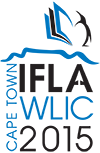
81st IFLA General Conference and Assembly
15-21 August 2015, Cape Town, South Africa
Call for Papers
Preservation and Conservation Section
Theme:
Planning and preservation in today’s libraries
Date
12-13 August 2015
Location
Durban, KwaZulu–Natal, South Africa
Society without Memory is a society without present or future
The Preservation of cultural heritage has multiple dimensions unsuspected and unexpected in the digital age. While it may have appeared as outdated, backward-‐looking, moribund, today its pertinence is renewed and underlined through the natural and man-made disasters that are frequently in the news. More than ever, we see that preservation and planning for today’s libraries is essential in our digital society: we need to preserve our memory, to provide access to information for future times, defend rights (including copyright), and make collections in paper or electronic form sustainable in the long term.
Another dimension of preservation and planning for today’s libraries is its global aspect: all peoples and all nations are now aware of the fragility of our world and wish to preserve the culture and the history of mankind for future generations. Digital technology—while certainly still in need of improvement and not providing a solution to everything but exploring some interesting avenues—represents a chance for the preservation of human history.
The Satellite Meeting is organized by IFLA’s Preservation and Conservation Section (P&C) on August 12th and 13th 2015 in Durban, KwaZulu–Natal before the annual and general IFLA Conference in Cape Town, which will be held under the auspices of the South African Preservation and Conservation Group (Sapcon) and the University of KwaZulu–Natal Special Collections wants to reflect the most current and up-to‐date issues of "Planning and preservation for today’s libraries". Taking into account the aspects listed it will be a place for exchange and idea sharing between South African and information professionals from around the world.
Topics
Contributions are invited on topics such as:
-
Challenges for Planning and preservation in today’s libraries
- Disasters and Preservation Issues: the Latest Developments evolution of risks (man-made, natural such as climate change, the impact of virtual technologies such as the cloud),
- Environmental sustainability is a much-debated topic and there are fears that extreme weather situations will become more abundant in the future. Energy may become more expensive in the future and the control of in-house climate is dependent on the use of energy for heating, de-humidifying and cooling—crucial factors for long-term stability of library materials. How might higher energy prices, or the switch from one energy system to another, have an effect on the long-term preservation of library collections?
- Sustainability for Planning and preservation in today’s libraries evolution of the treatment of materials and the changes in priorities for mass treatment, long term validity of physical treatment of materials, the balance between treatment reversibility and physical preservation needs, etc. physical repository versus virtual repository (cloud), open access to long term preserved collections, climate regulations, etc.
- Legal Issues for Planning and preservation in today’s libraries the respect of the public domain (free access and use for all) when the original is digitised, private manuscripts collections and privacy, copyright on documents related to cultural heritage, etc.
- The Digital Era reorganisation of preservation including the preservation of digitally born objects, new work flow in the library including preservation and access (restoration and digitisation), etc.
- The challenges of designing planning and constructing/renovating buildings for today’s libraries;
- Curriculum development including training book and paper conservators in the third world;
- Balancing Digitisation for Access with Digitisation for Preservation.
-
Planning and preservation in today’s libraries as a Worldwide Topic across Nations
- State of Planning and preservation of cultural heritage in Africa preservation activities, current situation and future requirements based on the four themes addressed the first day;
- State of preservation of cultural heritage in America (North America, Caribbean, South America) preservation activities, current situation and future requirements based on the four themes addressed the first day;
- State of preservation of cultural heritage in Asia Oceania preservation activities, current situation and future requirements based on the four themes addressed the first day
- State of preservation of cultural heritage in Europe and Switzerland preservation activities, current situation and future requirements based on the four themes addressed the first day
Proposal Submissions
The deadline for submissions is: 28 February 2015
Please send your proposal, abstract (300 words), biographical and contact information by email to: Danielle.Mincio@bcu.unil.ch and Nellie Somers somers@ukzn.ac.za.
Proposals will be reviewed by members of the Selection Committee. Authors of the selected proposals will be informed by 15 March 2015. Full papers are to be submitted by 1 June 2015 to allow time for editing and translations.
Paper presentation: between 10 and 15 minutes will be allowed for paper delivery.
Important Dates
|
28 February 2015 |
deadline for submitting proposals |
|
15 March 2015 |
successful speakers notified |
|
1 June 2015 |
full papers to be submitted |
Submissions
All proposals must be in before 28 February 2015.
Please note
At least one of the paper's authors must be present to deliver a summary of the paper during the Satellite conference. Abstracts should only be submitted with the understanding that the expenses of attending the conference will be the responsibility of the author(s)/presenter(s) of accepted papers.
All papers that are presented at the WLIC 2015 will be made available online via the IFLA Library under the Creative Commons Attribution 3.0 license. Authors of accepted papers must complete the IFLA Author Form.
All expenses, including registration for the conference, travel, accommodation etc., are the responsibility of the authors/presenters. No financial support can be provided by IFLA, but a special invitation letter can be issued to authors.
Congress Participation Grants
A list of opportunities for support is available on our Conference Participation Grants webpage.
Last update: 6 January 2015
